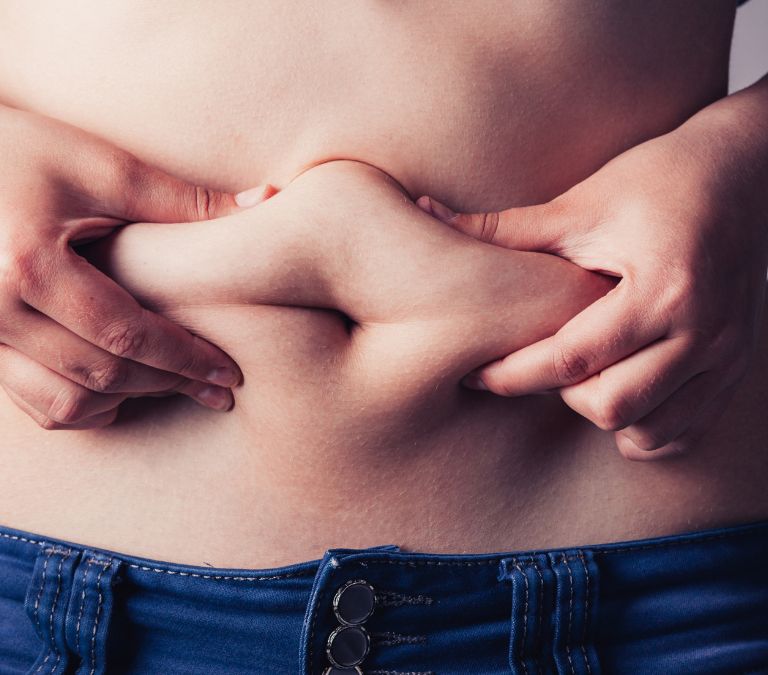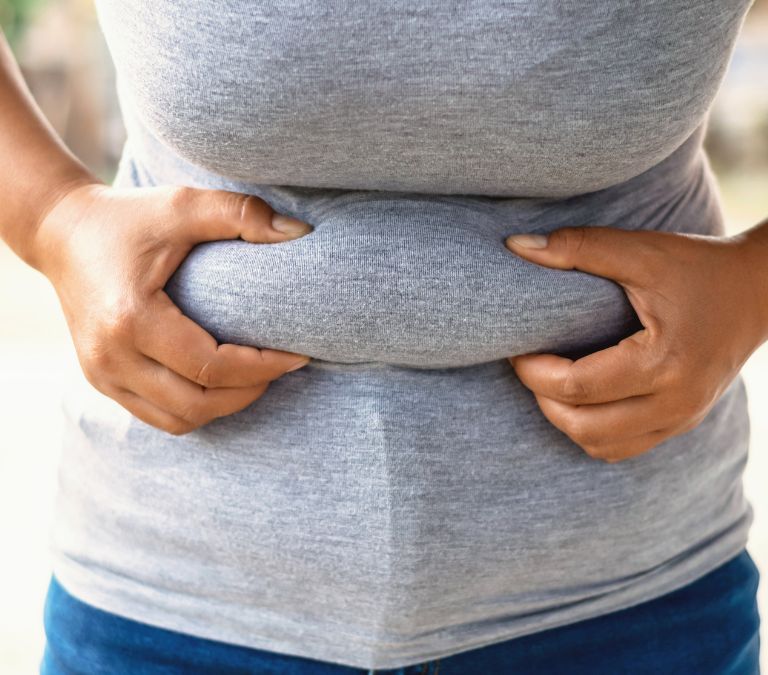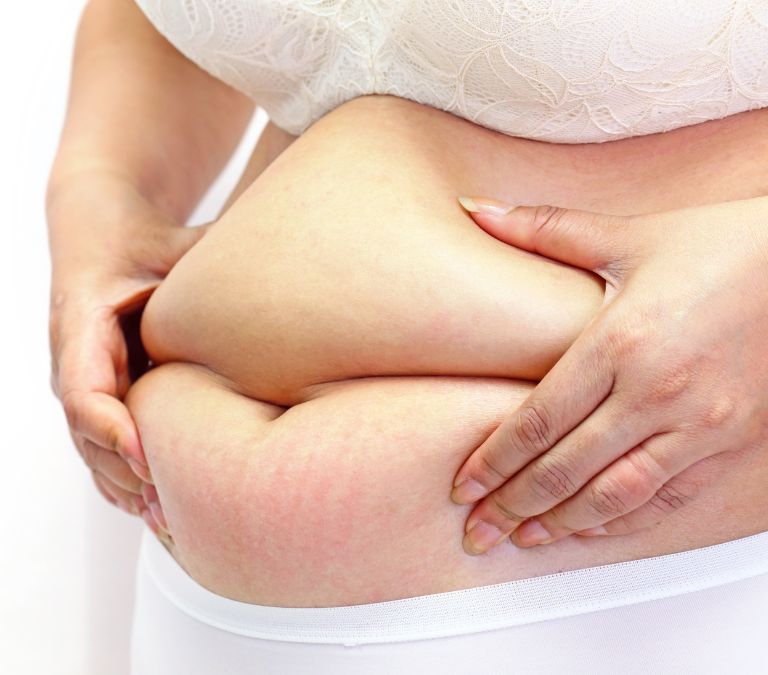When I first noticed puffiness and swelling in my belly region, I was confused because I knew I had been eating relatively healthy. There hadn’t been any significant change in my diet to warrant an outward change like weight gain. However, I did not think much about it as the swelling was slight at the onset. Usually, I witness such swelling every other month whenever I see my period.
It became more noticeable and uncomfortable with time, so I decided to speak to a doctor about it. After proper medical examination, the doctor believed I might be witnessing menopause bloating. It is one of the common perimenopausal symptoms that ultimately lead to menopause. It is one of the changes in a woman’s body during this phase.
Bloating is caused by excess gas or water in the gastrointestinal tract resulting in an uncomfortable pressure or feeling of fullness or tightness in the abdominal region. Swelling and temporary weight gain are also experienced due to this symptom of perimenopause.
You will notice the disparity in the length of your menstrual periods as you age, especially towards 50. It is a telltale sign that you are nearing menopause– a necessary stage in your reproductive life.
Perimenopause refers to the period which could be years and months that lead up to menopause. Menopause begins after this period with about 12 months of total lack of menses.
Specific other changes occur alongside the stoppage of periods when menopause kicks off. There is bound to be a change in your body’s hormone balance and frequent mood swings. In addition, you may become prominent in the midsection area. Many people call this the Menopause belly.

Perimenopause can alter your body shape altogether or only affect your midsection or belly region, making that area look bulky.
While this may sound like symptoms of old age that you cannot escape, there are some causative factors you can control and treat to make it more bearable for you.
You may want to begin addressing the issue by asking the pertinent questions: what is belly bulge before menopause, and what are the key factors or things happening in the body that affects or brings about it?
There is an excellent relationship between changes in hormone supply levels and weight gain. Estrogen levels in your body drop at neck-breaking speed as you age or grow towards the age of menopause. On the flip side, the androgen hormone levels in your body increase simultaneously. This irregularity in hormone levels can bring about an increase in the weight of the body.
People who experience this irregularity in hormone levels may also find that they have an increase in appetite too. They develop an appetite for so many different types of food. It is akin to how menstrual periods stir up a need for foods ranging from salty to spicy and fatty foods. The weight gained during this period averages up to 4.5 pounds.
Bloating is commonly associated with perimenopause and menopause. It is one of the symptoms characteristic of these periods of a woman’s adult life. It causes shifts and swelling to the woman’s abdomen during the day after meals.
The bloating can result from gas or water retention in the stomach. It may not be obvious trying to understand which of the duo of water or gas retention is the real cause of the bloating.
Gas bloating usually happens in the stomach and is simply air trapped in the stomach. It can be avoided or managed by controlling the way you eat. My doctor advised me to eat slowly, cut down completely on my soda intake and eat less food. The doctor also pointed out that, apart from diet, other factors such as exercise, smoking, stressful lifestyle, swallowed air, or even another undiagnosed disease condition could be accountable for the build-up of gas in the stomach.
Other than the stomach, swelling due to water retention can occur in other body parts. A friend of mine recounted that she had swellings on her palms, hands, and feet. Some other people experience bloating all over their bodies. Water retention can be severe as it can cause painful swelling in the affected body. You can also take steps to manage swellings or bloating emanating from excessive fluid retention.
Remember that this bloating is not exactly weight gain but is just like the puffiness you get during your period. As soon as your period stops, the puffiness subsides.
Bloating is one of the many symptoms you probably witness during perimenopause or menopause. It could be due to hormonal imbalance or changes in this phase of women’s lives. This condition is less likely to occur when you are past menopause. After menopause, your ovaries stop making the two primary hormones associated with that organ: estrogen and progesterone. Due to this, your body maintains a smaller quantity of hormones.
Bloating is manifested by swelling and tightness in the lower part of the body and other parts. It may bring discomfort to you, but you can manage it with lifestyle adjustments and administering medications.
Why You May Experience Menopause Bloating

I was expecting to start seeing signs of menopause when I clocked 45. So you can imagine how bemused I was when I began experiencing some of these symptoms characteristic of that period. Indeed, I was at a loss regarding the meaning of those signs. Later on, when I spoke with my doctor, I learned that menopausal signs and symptoms could occur long before menopause begins. This period of experiencing menopausal symptoms is known as perimenopause.
You will know you have hit menopause when you go 12 months straight without seeing your period. It results from your ovaries discontinuing the production of hormones like estrogen and progesterone. When you hit menopause, you bid goodbye to conception and childbirth.
The age at which women go into menopause varies from one woman to another. A more significant number of women experience it after they clock 50. The age may differ for other women who enter that phase earlier or later. You are declared postmenopausal if you have gone 12 months straight without seeing your period.
Bloating can occur more regularly during perimenopause than during menopause or postmenopause. During perimenopause, the changes in your body happen quickly, which can trigger excessive estrogen production, which will, in turn, bring about bloating. Bloating is not the only sign that characterizes perimenopause and menopause.
The imbalance in hormone production during these phases of a woman’s reproductive life can have other effects such as:
Hot flashes: They are sudden, brief feelings of heat that flush through you, making you dizzy and faint.
Night flashes: are the nocturnal versions of hot flashes. They are cold flashes that course through your body, giving you shivers.
Dryness of the vagina: dryness of the vagina results from fluctuations or stoppage in the production of the necessary hormones needed to keep the vagina moist. Dryness is also experienced in other body parts such as the eyes, mouth, or skin.
Following this are
- painful sexual intercourse resulting from dryness of the vagina.
- Insomnia due to night flashes
- Sudden mood changes may happen ever so often.
- Retention of gas in the gastrointestinal tract
It is believed that these factors, and not hormones are to be blamed for the bloating associated with menopause. It is true because, after menopause, I did not experience hormonal imbalance as much as I did during perimenopause and menopause.
Menopause bloating is caused by either or both of these: water retention and gas retention.
Water retention occurs due to the rapid production of estrogen in a woman’s body.
Apart from estrogen production, other factors contribute to menopause-related bloating. For example, there may be changes in the gastrointestinal tract. These changes can be due to several reasons: other underlying disease conditions, swallowing air, slow metabolism, stress, changes in food taken, and so on. These factors are responsible for gas retention and, therefore, menopause bloating.
Fortunately, these factors can be treated and managed. Changes in how you live can go a long way in reducing the unpleasant effects of menopause bloating. In addition, such lifestyle alterations can also ensure that menopause bloating is avoided even before it commences. Still applicable here are the overreaching effects of health history and genetics on how your body will react to the symptoms of menopause bloating. With this in mind, it is safe to say that these steps are not guaranteed to prevent the occurrence of menopause bloating.
Some preventive steps you can take against menopause bloating are the following.
Maintain an energetic lifestyle: an energetic lifestyle requires frequent and regular participation in physical movement and lively activities every other week. It will do your heart a great good by increasing its rate. It will also contain the estrogen production rate, thus minimizing the effects of menopause bloating.
Avoid smoking: so many health risks have been associated with smoking. Indeed, smoking is an encouraging factor for the onset of different medical conditions. It gets worse and more dangerous as you grow older. Quitting smoking can do you a world of good. Apart from protecting your heart, lungs, and other vital organs from damage, quitting smoking can help improve your energy levels, thus giving you the motivation to exercise and do other things that are good for you.
Visit your Doctor for Proper Examination and Advice: Menopause is a period of your life that requires that you become even more intentional about your health and body care. It would be best if you channel as much time and energy into maintaining a good health status at this time to withstand any health challenges that may occur.
Review your Diet: you are what you eat. Certain foods have been labeled as bloating-encouraging foods. It would be best if you avoided them as much as possible. Such foods include dairy products such as milk and cheese. Other foods to avoid are vegetables and fatty foods. These foods can cause gas or water retention, which aids bloating. Over-processed foods are also not healthy for you at this time as they usually contain unhealthy levels of processed sugar and salt.
Exercise: the importance of being active and working out cannot be overemphasized. It would be best to work out weekly as often as possible. You should follow strength-building exercise routines in addition to regular cardiovascular exercises.
Quit Chewing Gums: air can be swallowed while chewing gum, which ends up being trapped in your stomach, resulting in bloating.
Avoid Soda: carbonated drinks and their likes fill your stomach with air causing a bloated abdomen.
Choose Probiotics: these include yogurt, kefir, sauerkraut, and others that are excellent in aiding digestion.
Eat Smaller Meals: to aid easy digestion and absorption of food eaten, divide your meals into tiny portions to be taken little by little over a long period.
Other things to also take note of are the following:
- Shun alcohol.
- Be hydrated all day and night.
- Reduce salt intake.
Aside from these practical, non-medical measures of preventing and managing menopause bloating, medical means exist to prevent and manage this condition. They include:
Anti Bloating medications: you can quickly get these over the counter from a pharmacist. You should, however, confer with your doctor, who will advise you on the one to purchase.
Water Reduction Pills: these pills work wonders in ensuring that your body does not hold on to excess water. They are also known as diuretics. Be sure to speak with your doctor about getting some and obtaining their prescription.
Hormonal Contraceptive Pills: birth control pills have been proven effective against menopause bloating and other uncomfortable symptoms of perimenopause. They can balance hormone levels. Your doctors say it is essential to advise you on which of the pills are best for you.
Menopausal Hormone Therapy: this is a treatment that helps menopausal women to manage the uncomfortable symptoms of that phase. It is instrumental in stabilizing the imbalance in hormone secretion. It replenishes the less produced hormone to balance with the one in abundant supply, thus preventing the unfavorable results of the imbalance.
If the bloating had set in before you could prevent it, there are still specific steps that you can take to treat and manage the condition. You can lose weight during your life’s perimenopausal and menopausal phases and get back to your desired shape.
To begin with, you need to talk to your doctor about the moderate weight that is right for you. That is the weight at which you would be considered to be healthy. The doctor may also look at your body mass index (BMI). The critical thing to know is that it is possible to lose the weight gained during menopause or perimenopause though this may not be so easy to achieve.
Some of the steps you can take to make this happen to include the following:
Diet: Changing your eating pattern and food can go a long way in shedding the weight you gain during menopause or perimenopause. You must cut down on fatty foods and food rich in sugar and salt. All these types of food bring about weight gain and thus should be entirely avoided if possible.
On the other hand, foods rich in fiber and antioxidants are excellent for weight loss. They do this by reducing the stress that your body suffers during menopause. Such foods include dark chocolate, berries, nuts, and so on.
Some uncomfortable symptoms of menopause, such as hot flashes and mood swings, can be eased with iron and calcium-rich diets. It is also essential that you avoid caffeine and alcohol to reduce the frequency of symptoms like hot flashes and sleeping disorders.
Hydration: is essential to flush out the toxins that may build up in your body during this phase. You may also try out nutritional supplements with the guidance of your doctor, of course.
Exercise: weakness of the body or lack of strength is characteristic of the menopausal and perimenopausal stages. You are expected to feel uninterested and unable to participate in physically exerting activities. Still, you must get on the move to stay fit and treat menopause bloating. You do not necessarily need to work out as though you are preparing for the Olympics. A few quick steps a day can help get your heart rate reasonably and improve your vitamin D supply which are excellent weight loss triggers.
Other workout routines like yoga can help improve your body’s flexibility and bone density and tone your muscles.
Reduce stress by engaging in activities that take your mind away from bothering endlessly about how you look. As simple as they seem, certain activities like gardening, taking strolls, meditation and sightseeing can help calm your body down and stabilize your hormone production rates.
However, you may be desirous to get faster and more efficient relief and treatment of menopause bloating. In that case, you may want to consider some medical or cosmetic procedures to achieve that. Such procedures may be liposuction or cool sculpting.
Liposuction effectively treats menopause bloating by targeting specific areas of the body where the swelling occurs. The downside to this treatment is that it does not last. Thus, your body might still relapse to bloating again. You should employ the services of an experienced professional for advice if you are seriously considering getting this treatment.
Cool sculpting: this treatment helps to manage bloat after menopause. It is preferred over liposuction because you do not need to go under the knife for this procedure. Just like liposuction, the result it gives is not permanent.
Tummy tuck: This is another method that many people explore in a bid to get back in shape after menopause. It requires professionals to perform it, which is done in a hospital. It could take a longer recovery time. Consult with your doctor to ensure your medical worthiness for the surgery process.
Difference Between Menopause Bloating and Weight Gain During Perimenopause and Menopause

Bloating, caused by water retention in the body during perimenopause and menopause, can also lead to weight gain. Many women are at a loss whether they are merely putting on weight or experiencing menopause bloating.
While these two conditions are similar, specific differences distinguish one from another.
For one, bloating due to menopause, unlike weight gain, is usually characterized by belly swelling, which can be painful. Other bloating features include a quick build-up of weight after meals, easy enlargement of the stomach, and short periods of bloating that occur during or after meals and when the hormones begin to act up.
Weight gain, on the other hand, lasts longer. It only occurs during menopause because of food’s slow breakdown and absorption. It can happen together with or in the absence of bloating. Weight gain alone is not the cause of daily distention of the stomach.
Conclusion
Bloating is a condition experienced by women in the perimenopausal and menopausal stages of their reproductive life. Hormonal imbalance has been identified as a cause of bloating, but other factors also account for this condition. It can be treated by medical processes or by altering some habits. It does not last long as it fades away once the hormone levels are balanced again.







